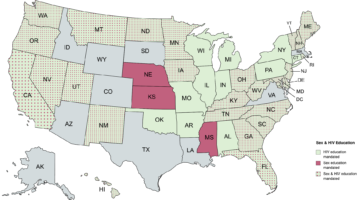What You Need To Know About Monkeypox
August 11, 2022 by Justin Lehmiller
Monkeypox has recently become one of the dominant topics of conversations in the sexual health community and in the media more broadly. Case counts are increasing quickly and vaccines are in short supply. While monkeypox (unlike COVID-19) is rarely fatal, it is a significant cause of concern on several fronts. For example, it can cause debilitating pain that sometimes requires hospitalization, it can potentially result in disfiguring scars, and the quarantine period can last up to a month (depending on how long it takes for symptoms to resolve).
There’s clearly a growing amount of concern about monkeypox–but that seems to be coupled with a number of common misconceptions. Here’s what you need to know, and how to protect yourself.
First, a lot of people seem to be under the impression that monkeypox is a sexually transmitted infection (STI), but it’s not technically considered as such. While is is true that monkeypox can be spread through sexual activity and that symptoms may appear on the genitals, you don’t necessarily need to have sexual contact with someone or be exposed to genital fluids in order to contract the virus. Likewise, safer-sex tools like condoms don’t provide complete protection from it because monkeypox is spread through skin-to-skin contact.
Also, as the WHO and other health agencies have reported, the virus may spread through exposure to contaminated objects (like clothing and bedsheets) and respiratory secretions. It can also be transmitted from animals to humans. So while it’s not considered to be an STI in the classic sense (i.e., in the way that something like chlamydia or gonorrhea spreads), the way to think about it is that monkeypox is an infection that can potentially be transmitted with sexual contact–but sex isn’t necessary for transmission.
Another common misconception is that monkeypox is a “gay disease.” It’s not. Monkeypox is something that can potentially affect anyone. It’s important to recognize that monkeypox isn’t a new infection by any stretch of the imagination–the first human cases were documented back in the 1970s. So we have plenty of data and history to know that this infection isn’t restricted to any particular sex, gender, or sexuality.
That said, we are now experiencing monkeypox outbreaks in parts of the world that haven’t previously had major outbreaks before–and, so far, these outbreaks are largely clustered in gay and bisexual men. Recent research finds men who have sex with men who happen to have HIV and other STIs seem to be disproportionately impacted, suggesting that immunocompromised persons are at elevated risk.
Given that men who have sex with men are the most at-risk community at the present time, it is reasonable to recommend that community members take some preventative measures to lower their risk. Here are some things you can do:
- Get vaccinated. However, note that full protection takes two doses of the vaccine and requires about 42 days from the first injection. One shot still provides significant protection, but you still need to give it time to work.
- Seek treatment at the first sign of symptoms or when notified of possible exposure. Early treatment can reduce the risk of severe disease.
- Discuss health status with partners or potential partners and avoid close contact with symptomatic persons and those with known recent exposures.
- Consider avoiding or limiting close contacts until you have full vaccine protection. This doesn’t necessarily mean you have to take a vow of celibacy–it could mean starting a “sex pod,” exploring virtual sex, or masturbating together at a distance. Remember: there are all kinds of ways to be sexual! And the more you expand your definition of sex, the more options there are on the menu.
For more monkeypox myth vs. fact and what you need to know, check out the episode below from the Coming Together for Sexual Health Podcast (or find links to listen on your favorite platform here). This episode offers both a personal story and a public health perspective on the subject that are well worth hearing. Check it out!
Also, for more information on monkeypox vaccination, check out this page from the CDC. For vaccine availability in your local area, consult your local public health department’s website or contact your healthcare provider.
Want to learn more about Sex and Psychology? Click here for more from the blog or here to listen to the podcast. Follow Sex and Psychology on Facebook, Twitter (@JustinLehmiller), or Reddit to receive updates. You can also follow Dr. Lehmiller on YouTube and Instagram.
Image Source: 123RF/blvcksquare

Dr. Justin Lehmiller
Founder & Owner of Sex and PsychologyDr. Justin Lehmiller is a social psychologist and Research Fellow at The Kinsey Institute. He runs the Sex and Psychology blog and podcast and is author of the popular book Tell Me What You Want. Dr. Lehmiller is an award-winning educator, and a prolific researcher who has published more than 50 academic works.
Read full bio >


